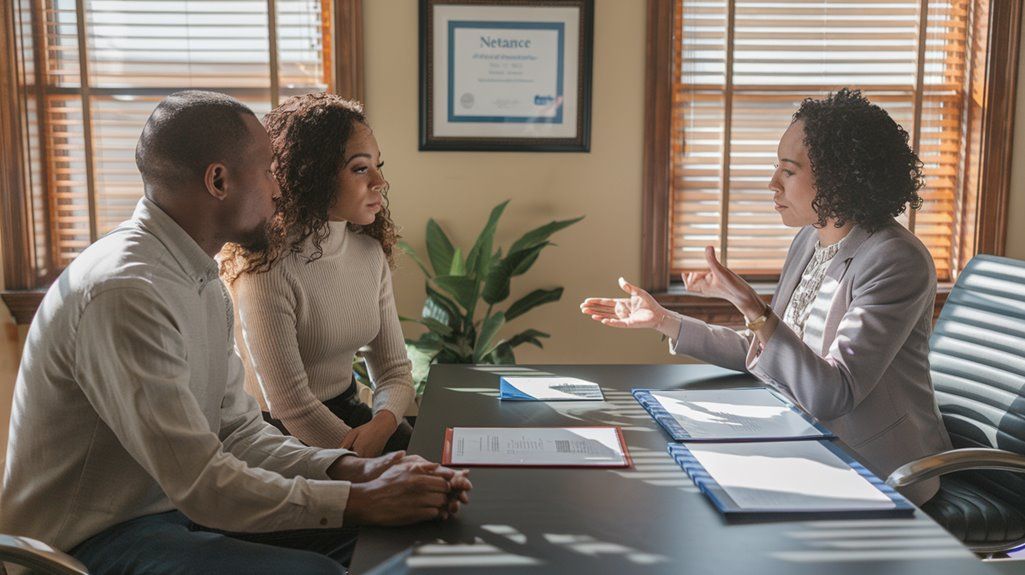Unlock the Secrets to a Happier Marriage: Select the Perfect Therapist
Share this article:

To unlock the secrets to a happier marriage, it's vital to choose the right therapist. Start by evaluating their credentials and ensure they specialize in issues like communication or infidelity. Look for a therapist who fosters emotional safety and aligns with your values. Familiarize yourself with various therapy methods, such as emotionally focused therapy or mindfulness techniques, to find what resonates with you both. Logistics matter too—consider location, availability, and insurance coverage. Choosing a therapist you feel comfortable with can make all the difference. Seeking further insights will guide you through this important process.
Listen to the Article
Key Takeaways
- Assess therapist credentials to ensure expertise in couples therapy and relevant relationship challenges like communication or infidelity.
- Explore various therapy methods to find one that resonates with your needs, such as CBT or emotionally focused therapy.
- Prioritize emotional safety by choosing a therapist who fosters trust and aligns with your values for open communication.
- Identify and discuss your unique communication styles to enhance understanding and connection during therapy sessions.
- Consider logistics like location, availability, cost, and insurance coverage to ensure accessibility and reduce stress during the healing process.
Credentials and Qualifications
When you're considering therapy for your marriage, it's crucial to start by evaluating the therapist's credentials and qualifications. You want someone who not only understands the complexities of relationships but also possesses the right educational background. Look for a therapist with a degree in psychology, counseling, or social work, as this foundation is essential for effective guidance.
Next, delve into their professional experience. A therapist who's worked with couples similar to you'll have valuable insights and strategies to navigate your unique challenges. Consider how long they've been practicing and whether they've dealt with issues relevant to your situation. This experience can significantly enhance the support they provide and increase your chances of a successful outcome.
Don't hesitate to ask potential therapists about their approach and any continuing education they've pursued. This shows their commitment to staying updated on the latest practices and research in marriage therapy.
Specialization of the Therapist
Choosing a therapist who specializes in the specific issues you're facing can make a significant difference in your marriage counseling experience. When you seek help, you want someone who understands the nuances of your unique challenges. A therapist's experience in particular areas—be it communication issues, infidelity, or parenting conflicts—can provide tailored strategies that resonate with your situation.
Therapy specialization matters because it ensures that your therapist is equipped with the right tools and insights. They've likely encountered similar cases before, allowing them to draw on proven techniques and knowledge. This targeted approach not only fosters a deeper understanding of your dynamics but also accelerates your progress.
As you evaluate potential therapists, consider their areas of specialization. Are they experienced in working with couples like you? Do they've a track record of helping partners navigate the challenges you currently face?
Therapy Methods Explained
When choosing a therapist for your marriage, it's essential to understand the various therapy approaches available.
Each method offers unique benefits that can help strengthen your relationship and improve communication.
Types of Therapy Approaches
Understanding the various therapy approaches can feel overwhelming, especially when you're seeking help for your marriage. Each method offers unique insights and tools to navigate your relationship's complexities.
For instance, cognitive behavioral therapy (CBT) helps you identify and change negative thought patterns, while emotionally focused therapy focuses on enhancing emotional connections between partners.
If you're looking for practical solutions, solution-focused therapy zeroes in on your goals and what's working well. Narrative therapy allows you to reframe your personal stories, fostering a deeper understanding of your relationship dynamics.
Integrative approaches combine elements from different therapies, tailoring the process to your needs. Psychodynamic therapy encourages exploration of unconscious patterns impacting your marriage, whereas systemic therapy emphasizes your relationship within the context of family dynamics.
Mindfulness techniques can help cultivate awareness and presence, enhancing communication. If you have children, art therapy and play therapy can engage them in expressing emotions, enriching family interactions.
Benefits of Couples Therapy
Couples therapy offers a transformative opportunity for partners to reconnect and strengthen their bond. It provides a safe space where you can explore your relationship dynamics, unraveling the complexities that may be causing friction. Through guided conversations, you'll discover deeper layers of understanding about each other, fostering emotional intimacy that might've been lost over time.
One of the greatest benefits of couples therapy is learning effective communication tools. You'll gain insights into how to express your feelings and needs without triggering defensiveness. This not only enhances your ability to navigate conflict but also deepens your connection, allowing for more meaningful interactions.
Additionally, therapy encourages vulnerability, helping you to share thoughts and emotions that you've perhaps kept hidden. This openness can reignite passion and trust in your relationship.
You'll also develop strategies to manage stressors together, ensuring that external pressures don't derail your partnership.
Ultimately, couples therapy equips you with the skills to build a resilient relationship. By investing in this process, you're not just addressing current issues; you're laying a strong foundation for a happier, healthier future together.
Embrace the journey—your relationship deserves it.
Importance of Personal Compatibility
Finding a therapist who aligns with your values and goals can make a significant difference in your journey.
When you feel comfortable and trust your therapist, it opens the door to honest communication, allowing you to explore deeper issues together.
It's essential to ensure that your therapist's style resonates with you, creating a supportive environment for growth.
Shared Values and Goals
Throughout your journey together, the alignment of shared values and goals plays a crucial role in fostering a happier marriage. When you and your partner hold similar beliefs about what's important in life, it creates a solid foundation for your relationship. This relationship alignment is essential, as it helps you navigate challenges and celebrate successes together.
Consider your future aspirations —where you see yourselves in five, ten, or even twenty years. Are you both striving for similar outcomes, whether that's raising children, pursuing careers, or enjoying adventures? When your goals are in sync, you're more likely to support each other's dreams and work collaboratively towards achieving them.
It's vital to regularly discuss your values and aspirations. Life changes can shift perspectives, and maintaining open dialogue ensures you stay on the same path. If you find discrepancies, it doesn't signify failure; instead, it's an opportunity for growth.
A skilled therapist can help facilitate these discussions, providing tools to bridge any gaps and strengthen your connection. Embracing shared values and goals cultivates understanding, fosters intimacy, and ultimately leads to a more fulfilling, harmonious marriage.
Communication Styles Alignment
Understanding and aligning your communication styles is essential for personal compatibility in a marriage. When you and your partner communicate effectively, you can navigate challenges and strengthen your bond.
However, differing styles can create communication barriers that hinder your connection.
To foster a harmonious dialogue, consider these key factors:
- Recognize your styles: Identify your unique communication preferences and how they differ from your partner's. This awareness lays the foundation for understanding.
- Practice active listening : Engage fully when your partner speaks. Show empathy by validating their feelings and responding thoughtfully. This helps bridge gaps in understanding.
- Adapt your approach: Be willing to adjust your communication style to meet your partner's needs. Flexibility can enhance mutual respect and support.
Comfort and Trust Factors
Effective communication is just one piece of the puzzle when it comes to building a happy marriage. Comfort and trust are essential components that foster emotional safety between you and your partner. When you select a therapist, ensure they create an environment where both of you feel secure sharing your feelings and vulnerabilities. This emotional safety allows for deeper exploration of your relationship dynamics, paving the way for healthier interactions.
You deserve a therapist who resonates with your personal values and communication style. When you feel comfortable with your therapist, it reflects positively in the sessions, making it easier to discuss sensitive topics. A therapist who understands your unique relationship dynamics can guide you toward breakthroughs that might otherwise remain hidden.
In seeking mastery over your marriage, prioritize finding a therapist who embodies empathy and trustworthiness. This compatibility not only enhances your therapeutic experience but also strengthens the bond you share with your partner.
Location and Accessibility
When it comes to finding the right therapist for your marriage, location and accessibility can make all the difference in your journey toward healing. You want to ensure that getting to sessions is as hassle-free as possible, so you can focus on what truly matters: strengthening your relationship.
Consider these key factors:
- Local resources: Identify therapists who are conveniently located within your community. This not only saves time but also minimizes the stress of travel.
- Transportation options: Assess the availability of various transportation methods to reach the therapist's office. Whether it's public transit or personal vehicles, ease of access is crucial.
- Virtual sessions: In today's digital age, many therapists offer online consultations. This flexibility allows you to connect with a professional without geographical constraints.
Accessibility isn't just about physical distance; it's about creating an environment where you and your partner feel comfortable and supported.
By prioritizing these factors, you can select a therapist who aligns with your needs and makes the healing process more manageable.
Availability and Scheduling
Finding a therapist with flexible availability can significantly ease the burden of scheduling conflicts as you work on your marriage. When you and your partner are navigating the complexities of relationship dynamics, the last thing you need is added stress from rigid scheduling.
Look for a therapist who offers various session frequencies—whether weekly, bi-weekly, or monthly—so you can find a rhythm that suits both of you.
Additionally, understanding the therapist's cancellation policies is crucial. Life happens, and sometimes you'll need to reschedule. A therapist with a compassionate approach to cancellations can help you feel supported rather than penalized.
Ask about their policies upfront; knowing how they handle missed appointments can alleviate anxiety about adhering to a strict schedule.
Evaluating Cost and Insurance Options
As you consider the logistics of therapy, evaluating cost and insurance options becomes a key step in ensuring that you and your partner can access the support you need.
Understanding the financial aspects can help you make informed choices that align with your budget and goals.
Start by reviewing your insurance policy to determine what mental health services it covers. This will help you identify potential therapists that fall within your insurance network.
It's also wise to conduct a cost comparison between in-network and out-of-network providers.
Here are three important factors to consider:
- Session Fees: Know the typical cost per session and any sliding scale options available.
- Deductibles and Copays: Understand your financial responsibilities before therapy begins.
- Insurance Coverage: Confirm if you need pre-authorization or if there are limits on the number of sessions.
Frequently Asked Questions
How Can We Tell if Therapy Is Working for Our Marriage?
When it comes to therapy, seeing is believing. Look for therapy indicators like improved communication, emotional intimacy, and conflict resolution. If you notice relationship progress, it's a sign that your efforts are paying off.
What Should We Do if We Disagree on Therapist Selection?
When you disagree on therapist selection, focus on discussing therapist qualities and explore each other's preferences. Use effective communication strategies to express your feelings, finding common ground that respects both your needs and fosters collaboration.
How Long Does Couples Therapy Typically Last?
Couples therapy duration varies, but most sessions happen weekly for about three to six months. You'll find progress depends on your commitment and openness, so stay engaged and trust the process for lasting change.
Can We Attend Therapy Sessions Individually as Well?
Absolutely! Attending individual therapy can foster personal growth and deepen your understanding of yourself. It's a supportive step that enhances your relationship, allowing you to bring your best self to couples sessions.
What Happens if One Partner Refuses to Attend Therapy?
If one partner refuses therapy, it creates communication barriers and emotional resistance. You can still foster understanding and support through open dialogue, aiming to address underlying issues and encouraging your partner to consider therapy in the future.
Connect with Us:
Connect with Us:



